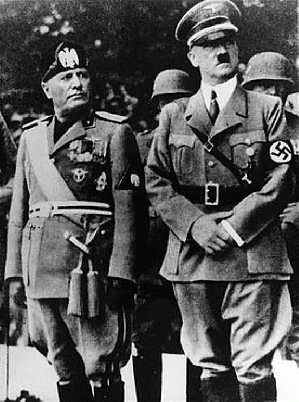
Benito Mussolini and Adolf Hitler
(Image by (From Wikimedia) Muzej Revolucije Narodnosti Jugoslavije, Author: Muzej Revolucije Narodnosti Jugoslavije) Details Source DMCA
Benito Mussolini and Adolf Hitler by Wikipedia
Even our esteemed UK WWII leader, Sir Winston Churchill, gave us a telling quote about his concerns for democracy, saying, "The strongest argument against democracy is a five-minute discussion with the average voter". Maybe he preferred democracy not of, for, and by "the average voter", but something more akin to the original Greek democracy, which would hardly seem universal - especially for slaves, foreigners, or women. Fortunately, he redeemed himself on another occasion, by saying, "It has been said that democracy is the worst form of government except all the others that have been tried". It would be nice to think that when Churchill said it, he meant it -- and it would be nice to think that all other elected people would mean it too, when they say such things. Yet we all know that words and actions aren't the same thing.
Another glimpse into the minds of those to whom we willingly or otherwise cede power, and privilege, we find in the 17th-century words of Oliver Cromwell. He refers to the Levellers who sprang from his triumphant 'New Model Army', which deposed King Charles I, despite a 'Divine Right' (it being God's idea), for him to rule. Cromwell said of the Levellers, who were trying to negotiate a partaking of democracy, "What is the purport of the levelling principle but to make the tenant as liberal a fortune as the landlord? I was by birth a gentleman. You must cut these people in pieces or they will cut you in pieces". That's not how we expect "gentleman" to behave these days. Not now, that drones are becoming more the weapon of choice. Yet there was no evidence then, or at any time since, that ordinary people like the Levellers, struggling for some say in the way they should live their lives, want to oust the ruling elite just for the sake of it, when fairness would suffice most reasonable folk.
Ollie started his political/military career from obscurity, albeit he was of the landed gentry. Yet, flushed with military success (a bit like Julius Caesar and such ilk), he assumed a much more dictatorial role as the Lord Protector of England, Wales, Scotland, and Ireland as from 16th December 1653. It seems something happens to individuals when we, the people, invest in them too much unbridled power. We can forgive the Levellers for their failure and commend their audacious bid; their times were different from ours and the ringleaders paid with their lives. Yet, considering the passion whistleblowers can provoke in the corridors of power these days, we might wonder if human rights and democracy, inasmuch as they existed at all, have been in the scheme of things just a recent political fad, with the elite now positioning themselves for a return to business as usual.
Bankers might tank the economy, by error or design, but we needn't let them undermine our democracy for, by definition, that's the responsibility of the majority; it's our job to make a pig's ear of our quality of life. We can manage that without the help of the outsourcers, simply by continuing to buy what they bring back into the country from the world's sweatshops. We can watch with blissful inertia whilst rapacious corporations bamboozle and bribe our politicos with pernicious trade treaties or we can buy more local produce. We can let bankers bail-in our money or we can bail it out of their banks and put it into tangible assets. We can coo 24/7 at royal babies on our TV screens or we can follow what's really happening - for as long as we're able to keep the internet largely uncensored. What we do, as individuals, matters more than we might imagine and our behaviour can influence those around us, especially in times of uncertainty.
Whether we do, or don't, believe that democracy is better than "all the others that have been tried" isn't the point either. Whilst we call ourselves democratic, by definition, it's incumbent on the majority to ensure that the will of that majority prevails--Regardless of whom we choose to personify that power. Mr Bean would do no worse than those we currently see parachuted into power by dark money. It doesn't matter how fiat currency distributes. Let those who worship it keep it all, for it would do them no good were we to adopt a different system of exchange -- by necessity or design. They'll have no power when the majority eventually susses out their true worth.
When the economy tanked at the end of 2007, the pundits and politicos were constantly referring to "the markets". It would seem that "the markets" were paramount. That was unquestionable. No alternative entered the media discussion. Until that point, the general understanding had been that elected politicians should do the will of the majority. Now the goalposts have eerily shifted. Now we elect politicians who honour the interests of the majority, sometimes -- but with increasing blatancy -- only where it doesn't affect the interests of the favoured few. When deceit and persuasion fails, the military starts to stock up on hollow-point bullets. Meanwhile, the police do Mutant Ninja Turtle impersonations on the streets of our cities.
In 2010, the New Labour era fizzled out and the UK public couldn't make up its mind, which was the worst of a bad lot. The pundits and politicos seemed to go into overdrive with a stampeding strategy. It seemed incontrovertible that the UK should quickly cobble together a coalition government before 'the [mighty] markets' should punish us duly for any procrastination over a petty little thing like democracy. Goaded by the argument that the economy was paramount, the people were hurriedly foisted with a coalition government, which immediately used the circumstances to retract all they'd promised on their soapboxes and legally lock in a five-year term -- ostensibly to deal with the economic 'black hole'. The politicos and pundits ratcheted up their market-trumps-democracy mantra and the hoi polloi had to cough up for their quack austerity prescription.
Nevertheless, looking back, the 'boomer generation' has been fortunate. Anyone brought up in the West, after WWII, has enjoyed a comparatively comfortable lifestyle until now. Societal and scientific progress made it seem inevitable that, as was the pattern throughout history, successive generations should expect greater progress and freedom. Now, devoid of any democratic mandate, it seems we're to re-evaluate our expectations for the future. It isn't wise to rock the boat, but maybe the boat is already rocking and it's time for the democratic giant to reawaken.
Most people would agree that democracy has its limits. It's not practical to expect that we should always elect authority. No one would deny that parents should decide what's best for their children, for example. Maybe even Sir Winston Churchill's quip about the "average voter" has some merit. Experience is important. Merit and talent, we should reward. Good leadership is invaluable - as is the ability to recognise it.
However, much of the changes we've seen recently, coming from the corridors of power, are simply not conducive to the democracy from which these people claim their legitimacy. Governments might deem such measures necessary components of their rule - but that just better proves their bankruptcy -- in many ways. It doesn't prove the infeasibility of other, better options. Ordinary folks, such as The Levellers and many since, struggled and laid down their lives for the democracy we once took for granted. The complacency of recent decades has made democracy ripe for confiscation and, bearing in mind our responsibility to past and future generations, maybe it's time we all woke up to it.





